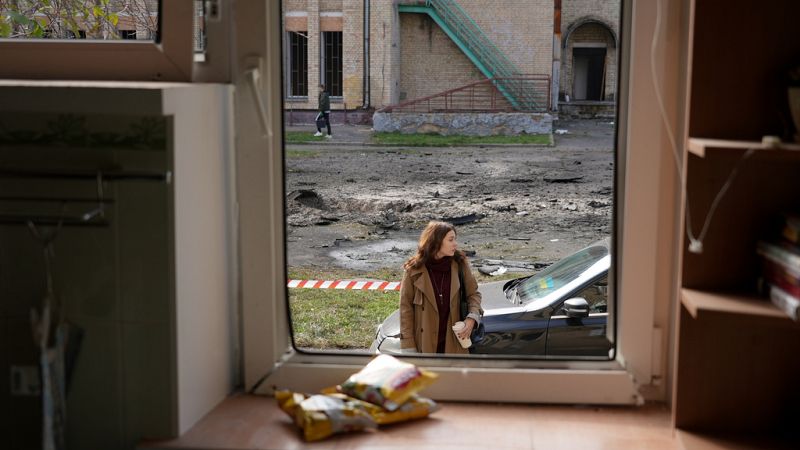Unblocking Russian frozen assets 'matter of time', says EU Commissioner Lahbib

Belgium is not hindering a new way of funding Ukraine’s war effort, EU Commissioner for Equality, Preparedness and Crisis Management, Hadja Lahbib, told Euronews in an exclusive interview.
Lahbib, who previously served as Belgium's Foreign Affairs Minister, spoke in the wake of a European Council summit in Brussels on Thursday, 23 October, attended by EU heads of state and government.
Leaders hoped to come to an agreement over a bold plan to use Russia's immobilised assets and issue a €140 billion interest-free loan to help Ukraine with its war effort.
However, the EU27 leaders parted without a decision on using Russia’s frozen assets to fund Ukraine’s defence, as they failed to placate Belgian concerns over the proposal. This spurred headlines stating Belgium had derailed the plan.
"[Belgium is] not blocking the loans," Lahbib said on Euronews' flagship programme The Europe Conversation. "For two years now, we have been giving Ukrainians [...] the interests of these loans."
She went on to reiterate that using the frozen assets in this way would be a first in the country's history.
"We don't have an example to follow, and it needs to be secured from a legal point of view. That's the only thing, that's the only point," she said. "I think it's just a question of time."
Meanwhile, leaders on Thursday settled on considerably weaker language in their summit conclusions, instructing the Commission to present "as soon as possible" a list of "options" to plug Kyiv's financial and military needs for 2026 and 2027.
Financial support for Ukraine will likely be picked up again at another EU Council summit in December.
Ensure Belgium isn't 'taken to court'
Belgium hosts most of the Russian funds immobilised in the EU at the Brussels-based institution Euroclear.
Belgian Prime Minister Bart De Wever has voiced both legal and financial concerns regarding the proposal and the position it would put Belgium in. The main concern for Belgium is the Russian retaliation if Moscow demands its assets back and sanctions are lifted.
He pointed to Japan, which holds €50 billion in Russian Central Bank reserves, and has already ruled out using these to help Ukraine, as the EU is now seeking to do.
De Wever also echoed the warning given by the European Central Bank (ECB) President Christine Lagarde, who stated that cash liquidity must be guaranteed if Russia demands repayment.
Following the summit, De Wever said that the idea remains under consideration.
"We just need to secure the legal aspect to be sure that Belgium is not going to be brought in front of a court of justice later on," Lahbib said.
'Your borders are our borders'
Ukrainian President Volodymyr Zelenskyy, who also attended the summit meeting on Thursday, had pleaded with leaders ahead of the gathering to take swift action to make Moscow pay for its war.
Russian attacks on Ukraine have surged in recent weeks, increasingly targeting Ukraine’s energy infrastructure, but also civilian infrastructure.
On Wednesday this week, Russia hit Ukraine's second-largest city of Kharkiv, hitting a kindergarten. Several people were killed, including children.
Lahbib emphasised that the message to Ukraine remains clear. "We stand with the Ukrainians and will support them in their war efforts."
"We are by your side always. We will help you to defend your borders because your borders are our borders, and we don't want to see the Russians further grab territories, Ukrainian territories."
Asked about whether Europe is prepared for war, she pointed to the changing nature of war.
"We are prepared every day for everything," Lahbib said. "But war is not [...] a soldier knocking at your door.
"Today's reality is a virus, a chemical attack, a nuclear incident that is maybe provoked by power outages. So we need to have a good understanding of today's threats."
Watch the full interview on The Europe Conversation, Friday 24 October at 21.30 CEST.
Today

